With a Mormon candidate among the front-runners for the 2012 GOP presidential nomination, a musical about Mormons playing on Broadway and The Church of Jesus Christ of Latter-day Saints (LDS) running television ads about ordinary Mormons, America is in the midst of what some media accounts have dubbed a “Mormon moment.”  But how do Mormons themselves feel about the media spotlight, the election campaign and their place in America? A major new survey finds a mixed picture: Many Mormons feel they are misunderstood, discriminated against and not accepted by other Americans as part of mainstream society. Yet, at the same time, a majority of Mormons think that acceptance of Mormonism is rising. Overwhelmingly, they are satisfied with their lives and content with their communities. And most say they think the country is ready to elect a Mormon president.
But how do Mormons themselves feel about the media spotlight, the election campaign and their place in America? A major new survey finds a mixed picture: Many Mormons feel they are misunderstood, discriminated against and not accepted by other Americans as part of mainstream society. Yet, at the same time, a majority of Mormons think that acceptance of Mormonism is rising. Overwhelmingly, they are satisfied with their lives and content with their communities. And most say they think the country is ready to elect a Mormon president.
These are among the findings of a comprehensive survey by the Pew Research Center’s Forum on Religion & Public Life of more than 1,000 Mormons across the country – the first of its kind ever published by a non-LDS research organization. Previous studies, including the Pew Forum’s 2007 U.S. Religious Landscape Survey, have found that Mormons make up slightly less than 2% of the U.S. public.
Six-in-ten Mormons (62%) say the American people as a whole are uninformed about Mormonism. Nearly half (46%) say that Mormons face a lot of discrimination in the U.S. today – which is higher than the percentage that says the same about blacks (31%) and atheists (13%). Two-thirds (68%) say the American people as a whole do not see Mormonism as part of mainstream American society. And when asked to describe in their own words the most important problems facing Mormons living in the United States today, 56% cite misperceptions about Mormonism, discrimination, lack of acceptance in American society and the like.
Yet most U.S. Mormons also think acceptance of Mormonism is on the rise, with 63% saying the American people are becoming more likely to see Mormonism as part of mainstream society. And 56% of those surveyed say the American people are ready for a Mormon president.
The nationwide survey of 1,019 Mormons, conducted Oct. 25-Nov. 16, 2011, finds that Mormons share many of the religious practices and beliefs of traditional Christianity. Three-quarters of Mormons (77%) say they attend church at least once a week, 79% say they donate 10% of their earnings to the church, 83% say they pray every day and fully 98% say they believe in the resurrection of Jesus.
Mormons are nearly unanimous in describing Mormonism as a Christian religion, with 97% expressing this point of view. Indeed, when asked to volunteer the one word that best describes Mormons, the most common response from those surveyed was “Christian” or “Christ-centered” (17%), and an additional 5% volunteered “Jesus.”
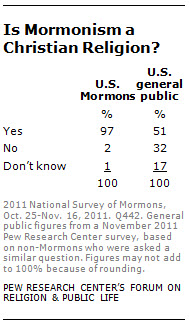
By contrast, many non-Mormons do not see Mormonism as a Christian faith. A November 2011 Pew Research Center survey found that one-third of non-Mormon U.S. adults (32%) say the Mormon faith is not a Christian religion, and an additional 17% are unsure whether Mormonism is Christian. In an open-ended question asking what one word best describes the Mormon religion, the same survey found that the most commonly offered response was “cult.”
There are a number of tenets that are central to the teachings of the LDS Church and widely held by Mormons that are not shared by other Christian traditions. Nine-in-ten Mormons believe that the president of the LDS Church is a prophet of God (94%) and that the Book of Mormon was written by ancient prophets (91%). Similarly large numbers believe that families can be bound together eternally in temple ceremonies (95%) and that God the Father and Jesus Christ are separate, physical beings (94%). (More information on these and other elements of Mormonism can be found in the glossary.)
The survey finds that Mormons place a high priority on family life. Large majorities say that being a good parent (81%) and having a successful marriage (73%) are among their most important goals in life, far surpassing the numbers in the general public who say the same. (See Life Goals for details.)
Geographically, Mormons are heavily concentrated in the western part of the United States. In this survey, 71% of the respondents reside in the West, including more than half (53%) who reside in states in the Mountain West and 34% who live in Utah (which is part of the Mountain West).2 In terms of their racial and ethnic background, Mormons are overwhelmingly white; 88% of the current sample is comprised of white non-Hispanics, while 7% are Hispanic, 1% are black non-Hispanic and 4% are of other racial and ethnic backgrounds.
Politically, Mormons are quite conservative and supportive of the Republican Party – even compared with other people who share some of their demographic characteristics. Two-thirds of Mormons (66%) describe themselves as politically conservative, and three-quarters of Mormon voters (74%) identify with or lean toward the Republican Party. By comparison, Pew Research Center surveys conducted from September-November 2011 find that 37% of U.S. adults describe themselves as conservative (including 40% of white non-Mormons residing in the Mountain West). And 45% of registered voters in the population as a whole (and 60% of white non-Mormons in the Mountain West) identify with the Republican Party.
Mormons and white evangelical Protestants resemble each other and stand out from the broader public in that majorities of both groups exhibit high levels of religious commitment. Nonetheless, Mormons perceive hostility directed toward them from evangelical Christians. Fully half of those surveyed (50%) say that evangelical Christians are generally unfriendly toward Mormons, compared with 21% who think evangelicals are neutral toward Mormons and 18% who say evangelicals are friendly toward Mormonism. Pew Research Center surveys show that roughly half of white evangelicals (47%) say that Mormonism is not a Christian religion, and two-thirds of evangelicals (66%) say that Mormonism and their own religion are very or somewhat different.
Being Mormon During a “Mormon Moment”
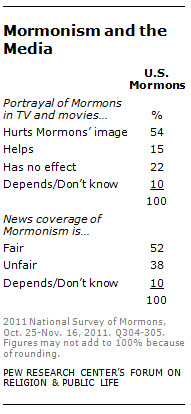
Many Mormons (54%) say that the way their religion is portrayed in television and movies hurts society’s image of Mormons in general. Far fewer (15%) say their image is helped by the portrayal of Mormons in entertainment media.
But Mormons are less negative in their assessment of the news media’s treatment of Mormonism. About half of those surveyed (52%) say that coverage of Mormons and Mormonism by American news organizations is generally fair, though a significant minority (38%) says news coverage of Mormonism is unfair.
The survey also finds that despite the large number of Mormons who feel that Mormons are misunderstood and discriminated against, the overwhelming majority are satisfied in their own lives and content with their communities. Nearly nine-in-ten Mormons (87%) say they are satisfied with the way things are going in their own life – more than say the same among the general public (75%). And 92% of Mormons rate their communities as excellent (52%) or good (40%) places to live. Mormons are more positive about their communities than is the public as a whole, among whom 81% rate their communities as excellent or good places to live. Community satisfaction is higher among Mormons who reside in the western part of the U.S. (where 55% give their community an excellent rating) than among those living elsewhere, and it is especially high among Mormons who reside in Utah (71% excellent).
Religious Beliefs and Practices
The survey confirms that Mormons are highly religious. About eight-in-ten (82%) say that religion is very important in their lives. A similar number (83%) says they pray every day. And upwards of three-quarters (77%) say they attend religious services at least once a week. More than two-thirds of Mormons (69%) fit all three of these descriptions, saying that religion is very important to them, that they pray every day and that they go to church every week. By this measure, Mormons exhibit higher levels of religious commitment than many other religious groups, including white evangelical Protestants.
Mormons are also firm believers in the teachings of their church. Asked whether they believe wholeheartedly in all the teachings of the LDS Church or whether they find some of the teachings of the church hard to believe, three-quarters of the Mormons surveyed (77%) say they believe wholeheartedly in all the church’s teachings.
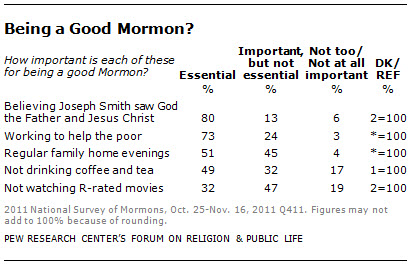
Mormons are well-known for avoiding beverages like coffee and tea as well as avoiding R-rated movies. Though a large majority of those surveyed say that these are important elements of being a good Mormon, many see them as less critical than other beliefs and practices. Fully eight-in-ten (80%) say believing that Joseph Smith actually saw God the Father and Jesus Christ is essential for being a good Mormon, and 73% say working to help the poor is essential to be a good Mormon. By contrast, 49% say not drinking coffee and tea is essential for good Mormons, and 32% say avoiding R-rated movies is essential to be a good Mormon. About half of Mormons (51%) say it is essential for Mormon families to regularly hold “family home evenings” (time set aside for family prayers and activities), and an additional 45% say it is important, though not essential, to do so.
Another distinctive aspect of Mormonism is the tradition of young adults participating in full-time missionary service (usually for a period of two years), called a proselyting mission. (See glossary.) The survey finds that roughly one-quarter of Mormons (27%) have served a full-time mission, including more than four-in-ten men (43%) and 11% of women. Slightly more than half of the former missionaries surveyed (56%) say their mission was very valuable in gaining converts to the LDS Church. And even larger majorities say their missionary experience was very valuable in helping them prepare for career success (80%) and for helping them to grow in their own faith (92%).
LDS Church leaders encourage Mormons to keep a supply of food in storage in case of catastrophe, recommending that at least three months of supplies be kept on hand. Eight-in-ten Mormons (82%) say they keep a supply of food in storage, including 58% who keep at least a three-months’ supply.
Ideology, Partisanship and Economic Views
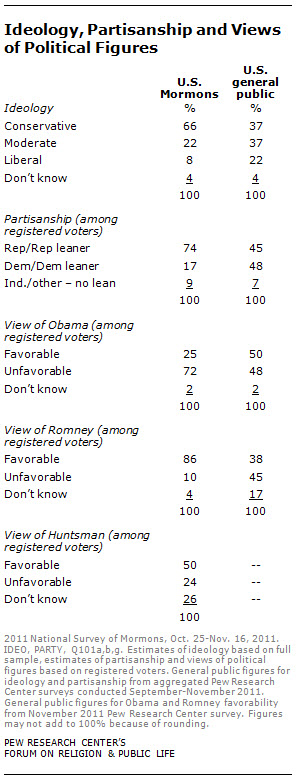
Mormons tend to be quite conservative in their political leanings and in their views on social and moral issues. Two-thirds (66%) call themselves conservatives, and three-quarters of Mormon registered voters (74%) are Republican or lean toward the Republican Party. These ideological and partisan leanings are reflected in their views of President Barack Obama, whose favorability rating among Mormon voters (25%) is half of what it is among voters in the public as a whole.
Mormons express highly positive views of GOP presidential candidate Mitt Romney (a fellow Mormon). Romney is viewed favorably by 86% of all Mormon voters and 94% of Mormons who are Republican or lean Republican. But even among Mormon Democrats and Democratic-leaning registered voters, 62% rate Romney favorably. In fact, Romney’s favorability rating is about as high among Mormon Democrats as it is among Republicans in the general population (56%).
Two other prominent Mormon political leaders are viewed less favorably than Romney. Half of Mormon voters (50%) express a favorable view of Republican presidential candidate (and former Utah governor) Jon Huntsman Jr., while 24% express an unfavorable view and 26% have no opinion. Huntsman is viewed more favorably by registered voters in Utah, where 70% offer a favorable assessment and only 4% are unable to offer an opinion about him. Less than a quarter of Mormon voters (22%) have a favorable view of Senate Majority Leader Harry Reid, a Democrat; 51% of Mormon voters have an unfavorable opinion of Reid while 27% express no opinion about him.
Mormons also tend to be conservative on other political issues. Three-quarters of Mormons (75%) say they prefer a smaller government providing fewer services to a bigger government providing more services; among the general public, 48% express a preference for smaller government. But Mormons are divided as to whether immigrants strengthen the U.S. because of their hard work and talents (45%) or burden the U.S. by taking American jobs, housing and health care (41%). On this question, Mormons’ views closely resemble those of the public as a whole.
Cultural and Moral Issues
Mormons tend to hold conservative views on social issues. Two-thirds (65%) say that homosexuality should be discouraged by society, while 26% say it should be accepted by society. Among the general public, by contrast, a majority says that homosexuality should be accepted by society (58%), compared with 33% who say it should be discouraged.
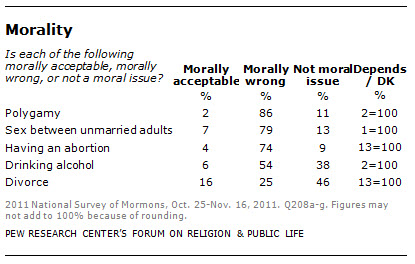
Mormons’ conservatism also extends to a variety of other moral issues. Nearly eight-in-ten (79%) say that sex between unmarried adults is morally wrong, far higher than the 35% of the general public who hold the same view. Three-quarters of Mormons (74%) say that having an abortion is morally wrong (compared with 52% of the general public). And 54% of Mormons say that drinking alcohol is morally problematic, more than three times the percentage of all U.S. adults who express moral reservations about drinking alcohol (15%).
Polygamy was officially banned by the LDS Church in 1890, and the survey finds little acceptance of polygamy among Mormons. Nearly nine-in-ten (86%) say it is morally wrong, 11% of Mormons say polygamy is not a moral issue and 2% say it is morally acceptable.
Mormons and Family Life
The survey confirms that family life is very important to most Mormons. Four out of five Mormons (81%) believe that being a good parent is one of the most important goals in life, and roughly three out of four Mormons (73%) put having a successful marriage in this category. This puts family concerns significantly above career concerns, having free time and even living a very religious life as priorities for Mormons.
Two-thirds of Mormon adults (67%) are married, compared with 52% of the general public.3 More than four out of five married Mormons (85%) are married to another Mormon. By comparison, 81% of married Protestants are married to another Protestant, and 78% of married Catholics are married to another Catholic, according to the Pew Forum’s 2007 U.S. Religious Landscape Survey.
Nearly six-in-ten Mormons (58%) say that the more satisfying kind of marriage is one where the husband provides for the family and the wife takes care of the house and children, while 38% say that a marriage where the husband and wife both have jobs and both take care of the house and children is preferable. Among the general public, the balance of opinion on this question is reversed – 30% prefer a marriage where the husband is the sole breadwinner, while 62% prefer a marriage in which both husband and wife work.
Other Findings
Other key findings of the Pew Forum’s 2011 National Survey of Mormons include:
- The majority of those surveyed say that most (53%) or all (4%) of their close friends are Mormon, while 33% say some of their close friends are Mormon and 10% say hardly any or none of their close friends are Mormon. Friendship networks that consist mostly or entirely of fellow Mormons are particularly common among those living in the West (especially in Utah, where 73% of those surveyed say most or all of their close friends are Mormon).
- As is the case with members of other religious groups in the U.S., significant minorities of Mormons express belief in certain tenets of Eastern religions. Roughly one-quarter of Mormons (27%) say they believe in yoga not just as exercise but as a spiritual practice, and one-in-ten Mormons (11%) say they believe in reincarnation. Among the general public, 23% say they believe in yoga as a spiritual practice and 24% say they believe in reincarnation.
- Three-quarters of Mormons (74%) were raised in the Mormon faith, while roughly one-quarter are converts (26%). When asked to describe their reasons for converting to Mormonism, six-in-ten converts (59%) cite the religion’s beliefs as the main reason they joined the church.
- Nearly four-in-ten Mormons (39%) say the GOP is friendly toward Mormons, more than twice the percentage that says the Democratic Party is friendly toward Mormons (17%). Mormon Republicans and Republican leaners are much more apt to say the GOP is friendly toward Mormons than to say this about the Democratic Party (45% vs. 14%). On the other hand, nearly as many Mormon Democrats and Democratic leaners view the GOP as friendly toward Mormons (30%) as say this about the Democratic Party (33%).
About the Report
The subsequent sections of the report describe the survey’s findings in more detail. Results are based on interviews conducted among a national sample of 1,019 Mormons between Oct. 25 and Nov. 16, 2011. Interviews were conducted with respondents who currently describe their religion as “Mormon.” The survey does not include interviews with former Mormons or respondents with Mormon backgrounds and heritage who no longer consider themselves to be Mormon. It also does not include Mormons living outside the United States. (According to the LDS Church, more than half of all Mormons live outside the U.S.) Full details on the survey’s methodology are included in section 5.
Footnotes:
2 The states in the Mountain West are Arizona, Colorado, Idaho, Montana, Nevada, New Mexico, Utah and Wyoming. More broadly, the West (a geographic category frequently analyzed in this report) includes these states as well as Alaska, California, Hawaii, Oregon and Washington. (return to text)
3 The estimate that 52% of adults in the general population are married comes from surveys conducted in 2010-2011 by the Pew Research Center for the People & the Press and differs slightly from a recent, comprehensive analysis of trends in marriage rates published by the Pew Research Center’s Social & Demographic Trends project, which was based on U.S. Census Bureau data. The Pew Research Center for the People & the Press surveys were used for comparison in this report because the marital status question in those surveys is identical to the marital status question used in the current survey of Mormons. (return to text)
Photo Credit: © Walter Bibikow/JAI/Corbis


